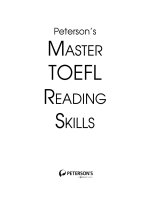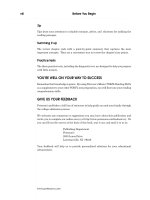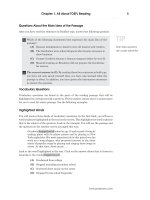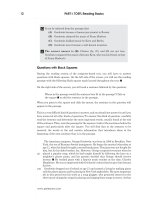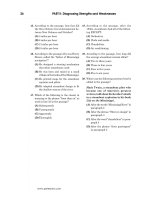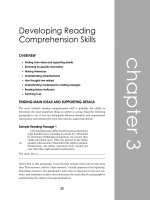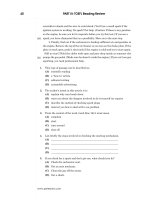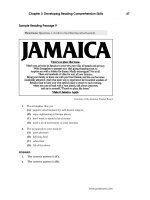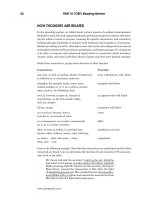Peterson’s master toefl reading skills part 9 pps
Bạn đang xem bản rút gọn của tài liệu. Xem và tải ngay bản đầy đủ của tài liệu tại đây (234.19 KB, 7 trang )
Chapter 3: Developing Reading Comprehension Skills 47
www.petersons.com
Sample Reading Passage 9
Directions: Questions 1–2 refer to the following advertisement.
Courtesy of the Jamaica Tourist Board
1. The ad implies that you
(A) require entertainment by well-known singers
(B) enjoy sightseeing in foreign places
(C) don’t want to spend a lot of money
(D) need a lot of excitement on your vacation
2. The ad appeals to your need for
(A) quiet pleasure
(B) delicious food
(C) relaxation
(D) All of the above.
Answers
1. The correct answer is (C).
2. The correct answer is (D).
03_TOEFL Reading Ch 3,31-91 7/29/06, 12:0047
48 PART III: TOEFL Reading Review
www.petersons.com
Sample Reading Passage 10
Directions: Questions 1–5 refer to the following advertisement. Respond to
the questions according to the nature of each item.
Courtesy of the New York Health & Racquet Club
03_TOEFL Reading Ch 3,31-91 7/29/06, 12:0048
Chapter 3: Developing Reading Comprehension Skills 49
www.petersons.com
1. The advertisement emphasizes
(A) locations
(B) a trial membership
(C) reduced cost
(D) opening hours
2. It can be inferred that if you join the club
(A) the sale ends on August 31
(B) you will go to all five club locations
(C) your body will improve
(D) you will get a refund
3. This ad appeals to people’s
(A) pleasure
(B) pride
(C) preservation
(D) All of the above.
4. From the context of the expression free clinics, it must mean
(A) cost-free medical care
(B) no charge for lessons
(C) liberated movement
(D) games
5. Membership in the club enables you to enjoy ________ in winter.
(A) the cold
(B) a full refund
(C) dropping by
(D) swimming
Answers
1. The correct answer is (C).
2. The correct answer is (C).
3. The correct answer is (D).
4. The correct answer is (B).
5. The correct answer is (D).
03_TOEFL Reading Ch 3,31-91 7/29/06, 12:0049
50 PART III: TOEFL Reading Review
www.petersons.com
EXERCISES: READING COMPREHENSION SKILLS
Directions: The passages are followed by questions based on their content.
Answer the questions on the basis of what is stated or implied in the passages.
QUESTIONS 1–5 ARE BASED ON THE
FOLLOWING PASSAGE.
The business of tennis clothes has
grown astoundingly in the past few years.
Over $250 million is spent annually on
the trappings of tennis. Apparently ev-
eryone wants to look like a pro, even
though 20% of the clientele has never
even played the game.
Manufacturers pay the stars lucrative
fees for wearing their brands of clothes
and wielding their racquets on center
court. Chris Evert-Lloyd, for example,
was rumored to have signed a five-year
contract for $5 million with Ellesse, a
producer of fancy, expensive tennis wear.
John McEnroe received a reported
$600,000 for playing with a Dunlop
racquet, $330,000 for sporting Tacchini
clothes, and $100,000 for tying his Nike
tennis shoes. Obviously, in a bad year,
these stars would have made more as
fashion models than as athletes.
Not only tennis players get free cloth-
ing, but also all the people involved in
the game—the referees, linespeople, ball
boys and girls—are living advertisments
for tennis wear producers. Where, tradi-
tionally, conservative white clothing was
required for the entire tennis coterie,
changing times have seen a new vogue
in tennis outfits. Flamboyant colors,
designers’ nameplates, geometric fig-
ures, and bold lines distinguish the new
tennis togs from their predecessors.
1. It can be inferred from the passage that
(A) tennis clothing appeals to the wealthy
(B) tennis stars get huge sums for en-
dorsements
(C) the price of tennis racquets has re-
mained stable
(D) bright colors entice people to buy ten-
nis wear
2. The author’s intention is to
(A) explain why the cost of tennis clothes
has risen
(B) defend tennis wear manufacturers
from complaints about their high
prices
(C) describe the means of advertising ex-
pensive tennis clothes
(D) describe the new tennis clothing
3. A good title for this passage would be
(A) The Stars at Play
(B) Big Business in Tennis Wear
(C) The High Cost of Playing Tennis
(D) Tennis Stars’ Flamboyant Clothes
4. It is stated that John McEnroe
(A) wore flamboyant clothing on the court
(B) must have earned over $1 million for
endorsing tennis products
(C) was a fashion model more than he
was a tennis player
(D) had had a bad year in tennis competi-
tion
5. It is implied that
(A) tennis clothing is bought by the well-
to-do
(B) everyone who wears expensive tennis
wear plays tennis
(C) tennis officials would prefer to wear
traditional white clothing
(D) fashion models wear tennis clothing
(5)
(10)
(15)
(20)
(25)
(30)
03_TOEFL Reading Ch 3,31-91 7/29/06, 12:0050
Chapter 3: Developing Reading Comprehension Skills 51
www.petersons.com
QUESTIONS 6–13 ARE BASED ON THE
FOLLOWING PASSAGE WRITTEN IN
THE 1980S.
The oil embargoes of 1973–1975 caused
vast chagrin among the manufacturers
of automobiles around the world. In par-
ticular, American companies were
obliged to create innovations in produc-
ing small cars that would compete in the
market with those flowing into the
American market from Japan and Eu-
rope. No longer could Americans afford
ostentatious, gas-guzzling vehicles.
Of paramount importance to today’s
car owner is the cost of gasoline. Ameri-
can manufacturers have collaborated to
supply their clientele with small cars
that provide the amenities of the stereo-
typed large American car, yet get better
mileage than any other car in the his-
tory of American car production. It has
become a question of ardently compet-
ing with foreign car manufacturers or
succumbing to the intense competition
and losing a lucrative business through
apathy. The American car industry has
been rejuvenated. The fuel consumption
of the new cars has decreased by 49%
since 1977; mileage has risen from an
average 17.2 miles per gallon to 25.6
miles per gallon. These figures are in-
dicative of a major turnaround in engi-
neering, manufacturing, and design. The
industry has made pertinent use of the
computer by installing a microproces-
sor, a thin piece of silicon about the size
of an aspirin, in new cars. This minia-
ture computer measures engine speed,
engine load, and other functions, and
sends messages to the fuel system and
other parts of the car’s mechanism, thus
producing lower gas consumption and
cleaner exhaust.
By designing sleek, roomy, beautiful,
sporty models, the automobile industry
has enticed both the average-income and
the affluent car buyer into purchasing
small cars. In addition to saving on gas,
today’s car is built to save on mainte-
nance and repair expenses. Further-
more, the manufacturer is including the
costs of maintenance inthe buyer’s pur-
chase price. New car advertisers now
claim that all the buyer has to pay for is
gas. To fight corrosion, new coatings
have been developed that protect against
the havoc caused by road salts, gravel,
and other materials. Hence, when car
owners are ready to turn in last year’s
car for a new one, they will find that
their well-preserved used cars will have
an unusually high trade-in value.
Fuel efficient, safe, emission free, eco-
nomical, and beautiful, today’s cars are
better bargains than any ever produced
before.
6. What significance did oil embargoes have
in the automobile industry?
(A) Car manufacturers worldwide had to
produce fuel-efficient automobiles.
(B) Automobile manufacturers had to
make smaller cars.
(C) The Japanese exported cars to
America.
(D) Americans continued to drive Ameri-
can cars.
7. In the second paragraph, there is a state-
ment that implies that
(A) Americans love large cars
(B) American auto manufacturers had
been indifferent to the need for smaller
cars
(C) Americans will not buy uncomfort-
able small cars
(D) All of the above.
8. The microprocessor is
(A) responsible for the American car
industry’s rejuvenation
(B) a major turnaround in American car
manufacturing
(C) a computer that saves gas and helps
create cleaner emission
(D) a pertinent use of fuel consumption
(5)
(10)
(15)
(20)
(25)
(30)
(35)
(40)
(45)
(50)
(55)
(60)
exercises
03_TOEFL Reading Ch 3,31-91 7/29/06, 12:0051
52 PART III: TOEFL Reading Review
www.petersons.com
9. According to the passage, small Ameri-
can cars are being bought
(A) by middle-class and rich clientele
(B) because they save fuel
(C) because of inflation
(D) by Americans who want to help Ameri-
can business
10. According to the passage, new cars are a
better bargain than those manufactured
in years past because they
(A) cost less to run and are built to last
longer
(B) have a built-in computer
(C) save fuel, have more safety features,
cost less to maintain, and have a
higher trade-in value
(D) are a lot smaller and don’t rust be-
cause of better coatings
11. From the information given in the read-
ing, you can infer that anticorrosive coat-
ings will not only protect a new car’s body,
but also
(A) make the car run better
(B) increase the trade-in value of the car
(C) increase the car’s mileage
(D) make the car safer to drive
12. From the passage you can infer that
(A) new cars are fuel efficient, sleek, and
beautiful
(B) Americans want their cars to be both
beautiful and practical in terms of
comfort and cost
(C) Americans will continue to buy Euro-
pean and Japanese cars because they
are cheaper
(D) if oil becomes plentiful and cheap
again, Americans will not return to
buying large cars
13. Another inference from the article is that
(A) the most important consideration in
buying a car is the cost of gas
(B) gas shortages caused American manu-
facturers to change their production
methods
(C) today’s cars are more sensible buys
than those in the past
(D) large cars are more comfortable than
small cars
03_TOEFL Reading Ch 3,31-91 7/29/06, 12:0052
Chapter 3: Developing Reading Comprehension Skills 53
www.petersons.com
ANSWER KEY
1. B 6. A 11. B
2. C 7. D 12. B
3. B 8. C 13. C
4. B 9. A
5. A 10. C
answers
03_TOEFL Reading Ch 3,31-91 7/29/06, 12:0053
